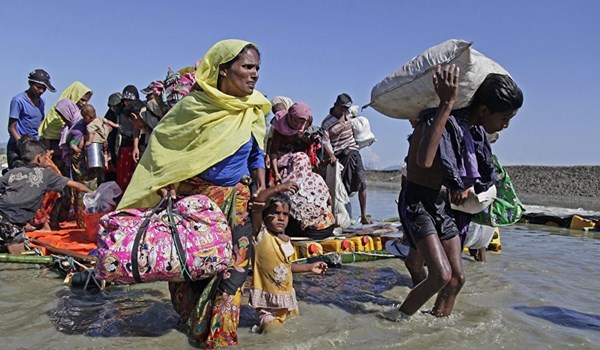
RNA - On Tuesday, December 26, Tehran sent an official letter to the UN Secretariat announcing its vote in favor of the resolution, given "the significance of the country's foreign policy considerations and core principles of its foreign policy."
This came after the United Nations General Assembly adopted a resolution calling on Myanmar to end military operations that have "led to the systematic violation and abuse of human rights of Rohingya Muslims in the country's Rakhine state.”
The resolution, tabled by the Organization of Islamic Cooperation, was adopted by a vote of 122 to 10 with 24 abstentions. Iran had initially abstained from voting due to the "politicized" nature of the Third Committee of the UN General Assembly. Still, Tehran condemned brutal crimes by Myanmar’s army against Rohingya Muslims and said the core policy of the Islamic Republic is to support the rights of all Muslims across the world, particularly the oppressed Muslims in Myanmar. Moreover, the Foreign Ministry cited "some technical" issues as the reason for Iran’s refusal to attend the session voting on the resolution.
The truth is, during the past three decades, Iran has always protested against the discriminatory approach by the UN General Assembly. The country has even issued a statement in condemnation of measures against Rohingya Muslims and announced that it abstained from voting, not because of the contents of the resolution, but due to a politically-motivated approach always taken to the issue of human rights.
However, now that the resolution calls for Myanmar to grant aid workers access and to give Rohingya Muslims full citizenship rights, even calling on UN Secretary General Antonio Guterres to assign a special envoy to the country, the world body should do the next best thing - ensure Myanmar halts its military campaign against Rohingya Muslims right away.
In addition, the General Assembly should emphasize that the forcible expulsion of more than 600,000 Rohingya from Myanmar to neighboring Bangladesh has aggravated the dire human rights and humanitarian situation of the Rohingya. After all, international decision-makers, members states of the United Nations and NGOs have a moral responsibility to stand in solidarity with the Rohingya minority in Myanmar and other persecuted people worldwide.
To that end, the General Assembly took the initiative to call upon the members of the Human Rights Council of the United Nations to hold a special session in solidarity with the Rohingya people and to address the situation in Myanmar. The call for peace, solidarity and justice in Myanmar was heard; on 5 December 2017, at a special session convened at the United Nations Office in Geneva to identify a common platform to end the atrocities committed on the Rohingya people guided by the principles of justice and human solidarity.
However, it is only through joint action and human solidarity that the world community can respond with a unified voice to address the plight of the Rohingya people in Rakhine srate and in Bangladesh. International efforts to address the situation will be in vain if the international community limits its action to include the adoption of resolutions and declarations in support of the Rohingya people – and actually act on them.
As reported by the UN Human rights Council, endemic poverty, violence and stark inequalities remain high in Rakhine state. Once the Rohingya refugees start to return to their home societies as envisaged in the ‘Arrangement on Return of Displaced Persons from Rakhine State’ signed on 23 November between Bangladesh and Myanmar which presupposes that it will become safe for them to do so, the main task for the international community will still lie in rebuilding a safe, stable and inclusive society for all.
Under International Law and International Humanitarian Law, the Rohingya people and other minorities in Rakhine state have the right to enjoy full and unconditional legal protection and fundamental freedoms. The government of Myanmar has the responsibility to review and revoke the 1982 Citizenship Law that degrades the status of the Rohingya people and other minorities to second-class citizens. All citizens of Myanmar are also entitled to enjoy equal and inclusive citizenship rights.
Last but not the least, the perpetrators of crimes against Rohingya Muslims must be brought to justice in The Hague. Strengthening accountability and transitional justice in post-conflict Myanmar are imperative to end impunity and bring peace, and to ensure similar state-sponsored crimes are not repeated elsewhere in the region and beyond.
847/940